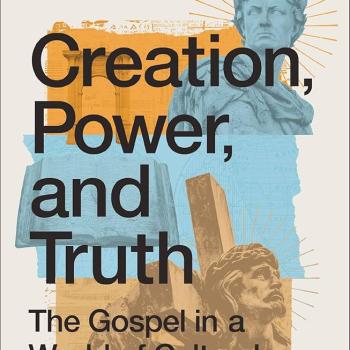During these weeks of summer doldrums, some students and I are reading and discussing Christ on Trial: How the Gospel Unsettles our Judgement (sic) by Rowan Williams. I had a little trouble getting into it, but now, in the middle of the book, I’m very impressed and hope many people will read it.
The bulk of the book is a commentary on the gospels and especially the passion narratives and especially the various accounts of Jesus’ trials. Williams sees in Jesus’ demeanor at his trials (plural because he was tried by the Jewish leaders and Pilate) the model for Christians’ posture in a world of oppression.
The Archbishop of Canterbury writes about God’s transcendence revealed in Jesus: “God’s transcendence is in some sense present in and with those who do not have a voice, in and with those without power to affect their world, in and with those believed to have lost any right they might have had in the world. God is not with them because they are naturally virtuous, or because they are martyrs; he is simply there in the fact that they are ‘left over’ when the social and moral score is added up by the managers of social and moral behaviour (sic). Or, to put it a bit differently, God appears in and through the fact that our ways of arranging the world always leave someone’s interest, welfare or reality out of account. We cannot organize our world so as to leave everyone a possible place. We are unavoidably bound to exclusion as we try to give form to our social and moral life.” (54)
So what is the Christian’s calling in such a world? Williams calls on Christians to acquire the “intelligence of the victim” which means “looking at the world from the point of view of those excluded by its systems of power.”
It seems to me there are really two Christianities in contemporary Western societies. The first is the Christianity (if it can be called that) that identifies with and allies itself with ideologies and systems of domination and their managers. It is Christianity that blames victims of oppression for their plight by implying they are lazy or lacking in faith. And it usually practically denies oppression as playing any role in widespread poverty and hopelessness. In my opinion, this “Christianity” is modeled for us in the writings of men like Michael Novak and Marvin Olasky and celebrated every Sunday in thousands of churches across the country that revel in the gospel of upward mobility and self-reliance.
The other Christianity sees in Jesus (among other things such as God incarnate!) the ultimate oppressed person–God entering into and identifying with the outsiders. This Christianity insists that part of being a faithful Christian is looking around for and at the victims of our social systems and dominant ideologies and identifying with them–acquiring the intelligence of the victim including what Miroslav Volf calls “double vision”–seeing the world through our own eyes and those of its victims. It also looks within the self for the hidden, unacknowledged presence of the victimizer–the person who is a privileged product of the systems that oppress others. This Christianity refuses to regard privilege and power as signs of God’s blessing and instead is suspicious of their sources.
As a white, middle class, upwardly mobile (compared with my parents and grandparents), educated, suburban man I struggle to recognize where all that comes from and how it entangles me in histories and systems of domination and oppression. My great-grandparents “bought” land in the upper Midwest dirt cheap and recently taken by force from native Americans who were herded onto reservations on the worst land anywhere–land no white Americans wanted. I have to face the fact that I am really not so different from the descendents of Germans who benefited from the extermination of 9 million people. (The exiled and then exterminated Jews’ property was confiscated by the German state and sold to its faithful supporters cheaply.)
And I have benefited from my grandfather’s wealth acquired by land speculation during the Great Depression. With a little savings provided by his family he was able to purchase foreclosed farm land which later became worth hundreds of thousands if not millions of dollars. The former owners of that land (or land just like it) were living in abject poverty across town as my grandfather grew wealthy and flourished.
Do I feel guilty about my privileged status? No. But I do and should feel guilty if I don’t acknowledge my indirect complicity in similar practices today and do what I can to alter the systems that make such injustices inevitable.
Williams’ point is that each one of us has both within us–the victim and the victimizer and we need to acknowledge that and do our best to confess our complicity in all kinds of evil including structural evil.
Why have I written so much here about illegal immigrants? Because I suspect they are among the weakest among us and, if Jesus were here, he would stand with them–not in their lawlessness but in their plight of being strangers in a strange land to which they have come simply to survive. I am always suspicious of my own prejudices. Sometimes I find myself irritated by hearing Spanish only all around me at the grocery store. Something within me rises up in anger and once or twice I’ve asked “What country am I living in?” But at my better moments of contemplation and self-examination I realize that’s the voice of the people who put Jesus on trial speaking from within me.
I admit I’m caught with one foot firmly planted in the first Christianity and the other foot precariously and uncomfortably dipping into the second.
But all I really have to do is remember where I came from. Yes, I said my grandfather was a wealthy land speculator. But it didn’t do me any good until I was in college and he helped me with my tuition. As a child I lived and worshiped among the poorest of the poor. At the age of four I lived with a family of illegal immigrants. Well, okay, not technically. They were breaking no laws. But that didn’t stop many of the people around them from hating them. They were hillbillies from the Ozarks who moved to Des Moines to find work when it was rare. They were willing to work for much less than other people because they were willing to live in houses without plumbing and without paint and without grass in the yard. But when my mother died and my father couldn’t take care of my brother and me they took us in and gave us food and shelter and a surrogate family for two years.
It would be so easy for me to forget those people who made up the bulk of our church in the “bottoms” of Des Moines. Many of them were society’s rejects for many different reasons. And by association, anyway, I was one of them. My dad was their pastor. We survived because of their love and generosity. But they were not welcome in other churches and in the suburbs and downtown. A few well-meaning professionals came to them so that we lined up and waited for hours for our vaccinations at the Settlement House. But when my family couldn’t afford the prescribed antibiotics for my strep throat I came down with rheumatic fever.
I knew what being an outsider was. But it’s been a long time since I really knew it. Now I only know it as a Yankee in the South. (Well, I’m not really a Yankee, but to some people around here anyone from “the North” is a Yankee!) But even that should serve as a reminder to me of how the wives and children of illegal immigrant workers must feel (although the two situations are hardly worth comparing!)
Years ago my wife and daughter and I lived in Germany for a year. It was a wonderful experience, but it taught us much about being foreigners. I think everyone should have that experience–not in a resort or on an army base but “on the economy.” You might think that was no taste of being an outsider, but you’d be wrong. We had many experiences of especially older Germans who lived through WW2 who treated us badly because we were Americans. Again, that was just a taste of what it must feel like to be an illegal immigrant in America.
Am I advocating abolition of borders? Not exactly. I’m realistic enough to know they’re necessary and so are laws protecting them. But I also know in my heart that if Jesus were here he’s seek out and stand with the weakest among us whoever they happen to be.












